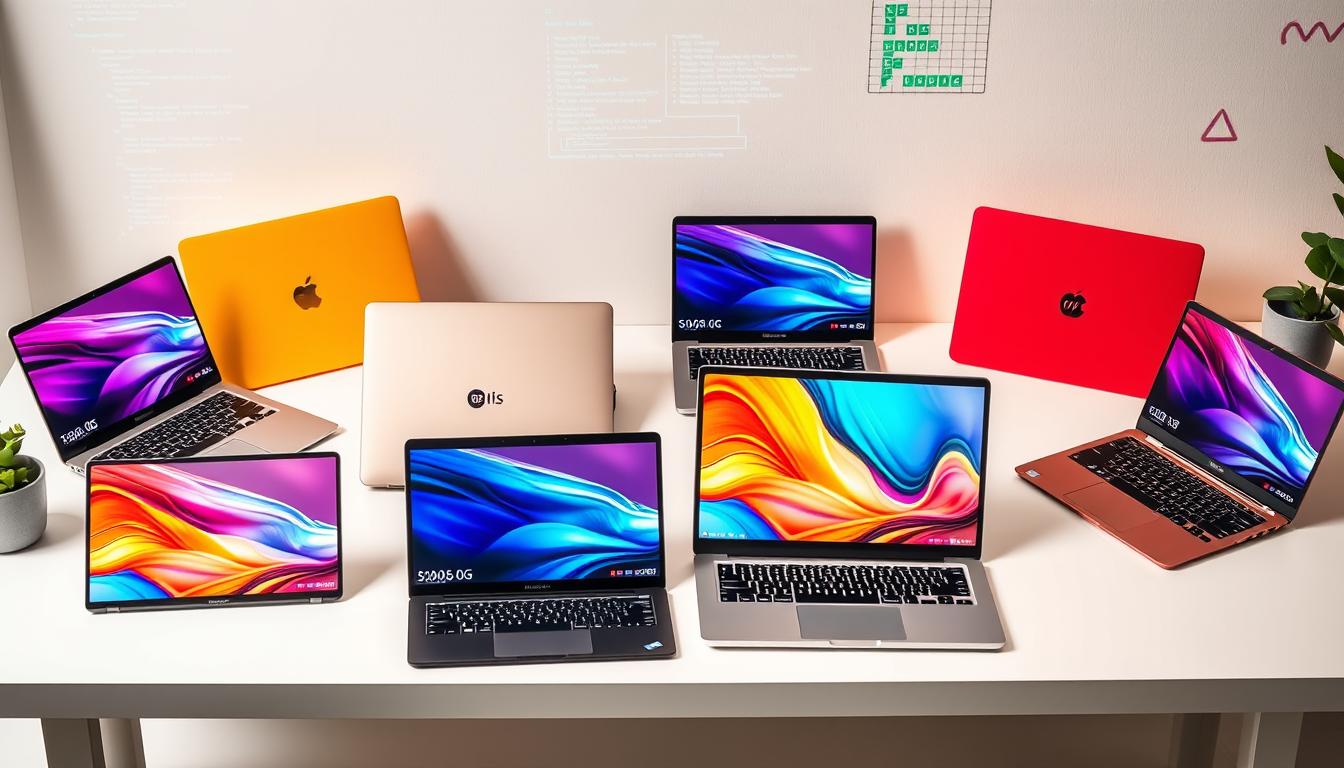Choosing the right laptop is crucial for computer science students. It’s about finding a balance between performance, portability, and cost. The right laptop can help you conquer tough coding tasks, while the wrong one can slow you down.Best Laptops for CS Students: Essential Pros and Cons
Imagine being able to compile code, run simulations, and work with others smoothly. This is what the best laptops for CS students offer. Let’s explore how to find the perfect one for you.
A collection of various sleek and modern laptops ideal for computer science students, showcasing their unique designs, features, and colors. The scene includes a diverse workspace with a wooden desk, books on programming, coding manuals, and tech accessories like headphones and a mouse. Each laptop is open, displaying different programming interfaces or coding languages on the screens. The background features a soft glow from ambient lighting to create a studious atmosphere. Emphasize the “laptops for computer” theme throughout the arrangement.Best Laptops for CS Students: Essential Pros and Cons
Key Takeaways
- Laptops for CS students must balance performance, portability, and price considerations.
- Top-performing options include the Samsung GalaxyBook 3 Ultra, Dell XPS 15, and Apple MacBook Pro M2 Max 16″.
- Essential specifications include display quality, processing power, memory, storage, graphics capabilities, size, weight, and battery life.
- Prices can range from under $1,000 for budget-friendly options to over $2,000 for high-end models.
- Choosing the right laptop can make a significant difference in your coding and programming experience.Best Laptops for CS Students: Essential Pros and Cons
Understanding Computer Science Student Laptop Requirements
Choosing a laptop for computer science students involves looking at key specs and operating systems. Finding the right mix of power and portability is crucial for your studies and coding projects.
Essential Hardware Specifications
Students often choose laptops with an Intel Core i5 or i7 processor for coding and multitasking. They also need at least 8GB RAM to run many apps at once. Solid-state drives (SSDs) are better than hard disk drives (HDDs) because they’re faster and more durable.Best Laptops for CS Students: Essential Pros and Cons
Operating System Considerations
The operating system you choose affects your computing experience. Many schools use cloud platforms like GitHub, but most laptops come with Windows or macOS. Linux is also common in schools for programming, allowing for dual-boot or virtual machine setups.Best Laptops for CS Students: Essential Pros and Cons
Performance vs Portability Balance
Computer science students face a big decision: performance or portability. Powerful laptops are great for tough tasks but can be heavy. Lighter laptops are easier to carry but might not be as powerful. The best laptop balances these two needs based on your needs.Best Laptops for CS Students: Essential Pros and Cons
Top High-Performance Laptops for Programming
Looking for the best laptops for computer science students and programming fans? Performance is crucial. High-performance laptops have the power and flexibility needed for tough coding tasks, data analysis, and multitasking. Let’s check out some top picks.Best Laptops for CS Students: Essential Pros and Cons
The Apple MacBook Pro 16-inch (2023) with M2 Pro or M2 Max processor is a top pick. These laptops have up to 96GB of RAM and 8TB of storage. They’re perfect for demanding programming tasks. Their great performance and long battery life make them ideal for advanced students and professionals.
The Dell XPS 17 is another great choice. It has a big 17-inch screen and strong components for any computer science task. Its specs are impressive, making it great for data analysis, complex programming, and resource-heavy apps.
| Laptop Model | Processor | Graphics | RAM | Storage | Battery Life |
|---|---|---|---|---|---|
| Apple MacBook Pro 16-inch (2023) | M2 Pro or M2 Max | Integrated 16-core – 30-core GPU | Up to 96GB | Up to 8TB | Over 19 hours |
| Dell XPS 17 | Up to Intel Core i7 / AMD Ryzen 7 Pro | Up to NVIDIA GeForce MX550 | Up to 32GB | Up to 2TB | N/A |
These high-performance laptops are great for multitasking, data analysis, and complex programming tasks. They’re perfect for advanced computer science students and professionals. Their strong specs and long battery life ensure a smooth and productive coding experience.https://www.youtube.com/embed/6ssBq4GM_h0
Pros and Cons of Laptops for Computer Science Students
Computer science students face a big decision: laptops or desktops? Laptops are now the top choice for many. They offer unmatched mobile computing benefits. Let’s look at the good and bad sides of using laptops for studying computer science.Best Laptops for CS Students: Essential Pros and Cons
Benefits of Mobile Computing
Laptops are great because they’re mobile. Students can work anywhere on campus. This means they can go to class, work on group projects, and code on the go. Plus, laptops make it easy to stay connected online for research and learning.Best Laptops for CS Students: Essential Pros and Cons
Limitations and Challenges
But laptops aren’t perfect. They might not be as powerful as desktops for computer science work. They can also be pricier for the same features. And, because they’re small, upgrading them later can be tough.
Cost-Benefit Analysis
Looking at the cost of laptops for computer science studies is key. Laptops might cost more at first. But, they offer flexibility and portability that can be worth it. For students who value being able to work anywhere, laptops might be the better choice.Best Laptops for CS Students: Essential Pros and Cons
| Advantages of Laptops | Disadvantages of Laptops |
|---|---|
| Mobility and Portability | Limited Upgradability |
| Seamless Internet Access | Potential Performance Constraints |
| Collaborative Opportunities | Higher Costs for Comparable Hardware |
| Versatility in Learning Environments | Ergonomic Challenges (Keyboard, Posture) |
Budget-Friendly Options Without Compromising Quality
Finding the right laptop for computer science can be tough. But, there are many affordable options that don’t skimp on quality. Let’s look at some top picks for CS students, offering great value without missing out on key features.Best Laptops for CS Students: Essential Pros and Cons
The Acer Swift 3 OLED is a great pick, priced around $999. It has strong performance with Intel Core i5 or i7 processors, 16GB of RAM, and a beautiful OLED display. This laptop offers a high-end experience at a lower price. The Apple MacBook Air M1 is also a budget-friendly choice. It has great performance and long battery life, all at a lower cost than the Pro models.Best Laptops for CS Students: Essential Pros and Cons
The Dell Inspiron 14 2-in-1 (7445) is a versatile and affordable 2-in-1 laptop, priced at about $729. The Acer Nitro V 15 (ANV15-51-59MT) is a budget-friendly gaming laptop, priced at $599.99. It’s a good option for CS students who also like to game.Best Laptops for CS Students: Essential Pros and Cons
Other great budget laptops for CS students include the Acer Aspire 5 (2022) and the Lenovo IdeaPad Flex 3 Chromebook. These laptops offer a good mix of performance and price. They meet the needs of most programming and computer science tasks without costing too much.
“An assortment of budget-friendly laptops suitable for computer science students, featuring various sleek designs and vibrant colors, displayed on a minimalist desk with coding and programming elements subtly included in the background, showcasing both pros and cons through visual contrasts, high-quality materials, and user-friendly interfaces, ‘laptops for computer.'”Best Laptops for CS Students: Essential Pros and Cons
When looking for an affordable laptop, consider the processor, RAM, storage, and display quality. This ensures you get the best value for your money. By researching and comparing options, you can find a laptop that fits your needs and budget as a computer science student.
Mac vs Windows vs Linux for CS Studies
Choosing an operating system (OS) for your laptop is key for computer science students. Microsoft Windows, Apple’s macOS, and Linux are the top choices. Each has its own benefits and challenges for learning, development, and software use.Best Laptops for CS Students: Essential Pros and Cons
Development Environment Compatibility
Many schools, like Grinnell College, use Linux for teaching. Linux’s terminal and package management are great for programmers. macOS, being Unix-based, also attracts many developers with its development-friendly setup.Best Laptops for CS Students: Essential Pros and Cons
Windows is not as popular for programming, but tools like Visual Studio Code are changing that. Your choice depends on your course needs and what you like best.
Software Ecosystem Comparison
Windows has a huge range of applications, making it great for many computer science courses. This is crucial for some classes that need specific Windows software.
macOS has Apple’s own apps, making it easy for those who like a smooth experience. Linux offers lots of free, customizable software but can be harder to set up.
Learning Curve Considerations
The ease of learning each OS varies. macOS is easy to use, perfect for beginners. Windows is familiar, making it easy for some students.Best Laptops for CS Students: Essential Pros and Cons
Linux is more challenging due to its customization and command-line interface. But, learning Linux can give students a deep understanding of systems and tools essential for programming.
Choosing between Mac, Windows, or Linux depends on your preferences, course needs, and adaptability. Knowing the strengths and weaknesses of each OS helps you make the best choice for your studies and career.Best Laptops for CS Students: Essential Pros and Cons
Essential Features for Programming and Coding
Choosing a laptop for computer science studies is important. Look for one that balances performance, portability, and functionality. This will help you in your studies and work.
A good keyboard is key for long coding sessions. Find laptops with full-sized, well-spaced keys for a better typing feel. A high-resolution display, especially with a 16:10 aspect ratio, gives more room for coding. This makes you more productive and reduces eye strain.
Good connectivity is vital for programming. Make sure your laptop has many ports like USB-A, USB-C, HDMI, and Ethernet. These let you connect monitors, hard drives, and other devices. Aim for at least 8GB of RAM, but 16GB or more is better. This is especially true if you’ll be using virtual machines or multiple development environments at once.
| Essential Laptop Features for Programming | Recommended Specifications |
|---|---|
| Processor | 9th-generation or higher Intel multi-core processor |
| RAM | At least 8GB, with 16GB highly recommended |
| Storage | 256GB or more of SSD storage |
| Display | Full HD (1920×1080) resolution, 16:10 aspect ratio preferred |
| Ports | Multiple USB-A, USB-C, HDMI, and Ethernet ports |
A strong processor is essential for coding. It helps with compiling code and running demanding software. Choose laptops with 9th-generation or higher Intel multi-core processors for a smooth coding experience.
Battery Life and Portability Factors
For computer science students, battery life and portability are key. Laptops now have batteries that last up to 15 hours on a single charge. This means you can work all day without needing to find a power outlet.Best Laptops for CS Students: Essential Pros and Cons
Power Management Tips
To get the most from your laptop battery life, try a few simple tips. Turn down the screen brightness, close apps you don’t need, and use power-saving modes. These steps help your portable coding computer last from morning to night.Best Laptops for CS Students: Essential Pros and Cons
Weight and Size Considerations
Choosing a laptop that’s easy to carry is important. The Apple MacBook Air, for example, weighs only 2.7-3.3 pounds. It’s light but still powerful, making it perfect for moving around campus.
Campus Mobility Requirements
The best laptop for college should last at least 8 hours. This ensures you can get through a full day of classes and studying without needing to recharge. A good battery and light weight mean you can stay focused and connected all day.Best Laptops for CS Students: Essential Pros and Cons
| Laptop Model | Battery Life (Tested) | Weight |
|---|---|---|
| Asus Zenbook 14 OLED | 14 hours | 2.9 lbs |
| Apple MacBook Air (M1, 2020) | 14.5 hours | 2.8 lbs |
| Acer Aspire 3 Spin 14 | 8.5 hours | 3.3 lbs |
Future-Proofing Your Investment
Choosing the right laptop for computer science studies is key. Look for models with parts you can upgrade, like RAM and storage. Choose laptops with better processors and more RAM than you need now. This way, your laptop will last longer as your work gets harder.
Find laptops with Thunderbolt ports for future growth. Even if you don’t need a dedicated GPU now, it’s smart. It lets you handle tough tasks later, like machine learning or graphics.
- Opt for laptops with upgradeable RAM and storage for future-proofing
- Consider higher-end processors and more RAM than immediately needed
- Look for laptops with Thunderbolt ports for future expandability
- Choose a laptop with a dedicated GPU for flexibility with future coursework
Getting a laptop that grows with you is a smart move. Future-proof your investment to keep up with your goals.
“Futuristic laptops for computer science students, showcasing sleek designs and advanced technology, juxtaposed with pros and cons illustrated visually, vibrant color palette, high-tech environment, symbolic elements representing programming and innovation”Best Laptops for CS Students: Essential Pros and Cons
Conclusion
Choosing the best laptop for a computer science student is not easy. Your needs, budget, and preferences matter a lot. High-performance laptops like the Lenovo ThinkPad X1 Carbon Gen 10 or Microsoft Surface Laptop 5 are great. They have powerful processors, lots of memory, and long battery life.
For those on a budget, options like the Acer Swift 3 OLED or MacBook Air are good choices. Think about what operating system you prefer, how portable you need it, and what software you’ll use. These factors help you decide.Best Laptops for CS Students: Essential Pros and Cons
Getting a good laptop is an investment that pays off in school and later in your career. You might pick a Windows PC, a MacBook, or a Linux system. The right laptop helps you handle computer science tasks with ease. By picking wisely, you’ll be set for success in your studies and future jobs.
FAQ
What are the essential hardware specifications for laptops suitable for computer science students?
CS students need a laptop with at least an Intel i5 or i7 processor (or AMD equivalent) and 2.5 GHz speed. They should have 8-16GB RAM and 256GB-1TB SSD storage. Many prefer Unix-based systems like Linux or macOS for their developer-friendly environments.
What are the top high-performance laptops recommended for programming and advanced computer science tasks?
For top performance, consider the Apple MacBook Pro 16-inch (2023) with M2 Pro or M2 Max processors. It offers up to 96GB RAM and 8TB storage. The Dell XPS 17 also stands out with its large 17-inch display and powerful components for any CS workload.
What are the pros and cons of using laptops for computer science students?
Laptops offer flexibility and portability, perfect for working anywhere or during commutes. They’re great for collaborative projects and lectures. However, they might have less powerful components than desktops and cost more for similar performance.
What are some budget-friendly options for computer science students that don’t compromise on quality?
The Acer Swift 3 OLED is a budget-friendly option with Intel Core i5 or i7 processors, 16GB RAM, and a high-quality OLED display. It’s often priced around $999. The Apple MacBook Air M1 also offers excellent performance and battery life at a more accessible price than the Pro models.
What are the key differences between macOS, Windows, and Linux for computer science studies?
macOS is favored by many developers for its Unix-based system and robust ecosystem of development tools. Windows is widely compatible with software and often required for specific CS courses. Linux is open-source and customizable but may be harder to learn. The choice depends on personal preference and course needs.
What are the essential features to look for in a laptop for programming and coding?
Look for a laptop with a comfortable keyboard for long coding sessions. A high-resolution display, preferably 16:10 aspect ratio, is also important for more vertical space. Multiple ports for external devices are essential. Aim for at least 8GB RAM, with 16GB or more for running virtual machines and multiple environments. SSD storage ensures fast boot times and file access. A processor with good single-core performance is key for compiling code efficiently.
What factors should be considered for battery life and portability when choosing a laptop for computer science students?
Battery life is crucial, with top models like the Apple MacBook Pro offering over 20 hours. To save battery, lower screen brightness and close apps you don’t need. Ultraportable options like the MacBook Air balance performance with mobility. Look for laptops under 4 pounds with at least 8 hours of battery life for a full day of classes and study sessions.
How can computer science students future-proof their laptop investment?
Future-proof your laptop by choosing models with upgradeable components like RAM and storage. Opt for higher-end processors and more RAM than you need now. Consider laptops with Thunderbolt ports for future expandability. Even if you don’t need a dedicated GPU now, it can be useful for future coursework or projects.
Source Links
- https://simpleprogrammer.com/best-laptops-for-computer-science-students/ – The BEST Laptops for Computer Science Students in 2023 – Simple Programmer
- https://www.collegevine.com/faq/103536/need-advice-on-college-laptops-for-cs-majors – Need Advice on College Laptops for CS Majors
- https://www.collegevine.com/faq/159753/ideal-laptop-for-computer-science-students – Ideal Laptop for Computer Science Students?
- https://laptops.eng.uci.edu/student-laptops/laptop-faq – Engineering Labs & Laptops – Laptop FAQ
- https://www.techradar.com/news/best-laptop-for-programming – Best laptops for programming of 2024
- https://www.rtings.com/laptop/reviews/best/by-usage/programming – The 4 Best Laptops For Programming of 2024
- https://www.pcmag.com/picks/the-best-laptops-for-programmers – The Best Laptops for Programmers in 2024
- https://www.geeksforgeeks.org/advantages-and-disadvantages-of-laptops/ – Advantages and Disadvantages of Laptops – GeeksforGeeks
- https://techwithdom.com/blog/laptop-or-desktop-as-a-computing-student/ – Laptop or Desktop? as a Computer Science Student – TECH WITH DOM
- https://www.pcmag.com/picks/the-best-budget-laptops – The Best Cheap Laptops for 2024
- https://www.techradar.com/news/mobile-computing/laptops/10-best-laptops-for-students-983385 – The best student laptops in 2024: top laptops for college and school
- https://rebelsky.cs.grinnell.edu/~rebelsky/musings/buy-computer-2024 – What kind of computer should you buy? (2024 version) (#1293)
- https://manmadecycle.com.au/blogs/news/mac-os-vs-windows-which-is-better-for-students – Mac OS vs Windows: Which is Better for Students?
- https://wisetekstore.com/blogs/blog/cracking-the-code-top-laptops-for-computer-science-students?srsltid=AfmBOoqFC0nA-zNC_kIHOynALv580HPl-yOiV3Hl6txvokPmOk2XqpWm – Cracking the Code: Top Laptops for Computer Science Students
- https://www.livescience.com/best-laptops-for-coding-and-programming – Best laptops for coding & programming 2024: Powerful portable computers
- https://www.cdw.com/content/cdw/en/articles/hardware/laptop-vs-desktop.html – Laptop vs. Desktop: Pros and Cons
- https://www.nytimes.com/wirecutter/reviews/best-laptops-for-college-students/ – The Best Laptops for College Students
- https://www.pcmag.com/picks/the-best-battery-life-laptops – The Best Battery Life Laptops for 2024
- https://www.techradar.com/news/the-best-laptops-for-engineering-students – Best laptop for engineering students in 2024: Top picks for every budget
- https://www.pcmag.com/picks/the-best-laptops – The Best Laptops We’ve Tested (December 2024)
- https://alertcampusgenius.com/blog/when-should-i-update-my-college-laptop-essential-guide-for-students-2024 – When Should I Update My College Laptop? – Essential Guide for Students 2024
- https://www.linkedin.com/pulse/5-best-laptops-computer-science-students-lucy-wanjohi-uh7hf – 5 Best Laptops for Computer Science Students
- https://tech.analyticsinsight.net/mac-vs-pc-for-students-pros-and-cons-of-each-platform/ – Mac vs PC for Students Pros and Cons of Each Platform



